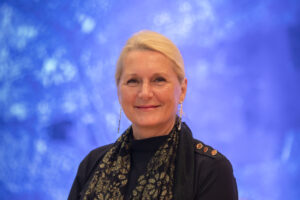 Pascale Ehrenfreund, recipient of the WIA-E Outstanding Achievement Award 2020, shares her thoughts on effective support strategies for women, networking, and her personal involvement in promoting gender diversity.
Pascale Ehrenfreund, recipient of the WIA-E Outstanding Achievement Award 2020, shares her thoughts on effective support strategies for women, networking, and her personal involvement in promoting gender diversity.
WIA-E: Why did you choose a career in the aerospace industry, and how did you get here
P.E.: I hold a Master degree in Molecular Biology, a PhD in Astrophysics, and a Master degree in Management & Leadership. As an astrophysicist my research covers a wide range of topics including the analysis of satellite data, instrument development for planetary exploration as well as the interdisciplinary topic of extraterrestrial life as a member of the National Aeronautics and Space Administration (NASA) Astrobiology Institute. I was fortunate to be involved already in an early stage of my career in exciting space missions. Over the last three decades I have contributed as Principal Investigator, Co-Investigator and Team Leader to space research missions of the European Space Agency (ESA) and NASA as well as experiments in low Earth orbit and on the International Space Station (ISS). Between 2005 and 2008, I was a Distinguished Visiting Scientist and Consultant at the Jet Propulsion Laboratory/Caltech, Pasadena, USA. As Research Professor of Space Policy and International Affairs at the Space Policy Institute (George Washington University) I address since 2008 policy aspects of global space exploration. In 2012, I founded a start-up: Leiden Measurement Technology (LMT) in Silicon Valley, that specializes on novel scientific instruments for the detection of organic and inorganic compounds, using microfluidics, optics, spectroscopy, and chemical extraction. Since 2015 I am the chair of the Executive Board of the German Aerospace Center (DLR).
WIA-E: You have been a dedicated supporter of WIA-E for many years. How do you support women in your field in your daily work?
P.E.: For every CEO there has to be a clear commitment to support more women in leadership. I engage personally in regular meetings and workshops concerning gender balance in science and management positions. We track the implementation status of more equal opportunities within DLR. I also strongly support dedicated programs for the advancement of women in the organization. In my position as CEO of DLR it is important to support diversity management activities by providing human and financial resources. Like many WIA members I am a mentor and try in personal conversations to encourage women to take on more responsibility.
WIA-E: What measures do you think are most effective for increasing the opportunities for women to grow into leadership positions?
P.E.: It has been shown that the mandatory quotas for women (although initially a very controversial topic) have so far been the most effective means of sustainably increasing the proportion of women in the workforce. For instance, as a result, a steady increase in the proportion of women in leadership positions can be observed at DLR.
Furthermore, group-specific training for women that are looking for a career are very important. This begins at DLR as part of the graduate program for female doctoral students (“Career strategies for women”). Mentoring and talent management programs are equally important. On the one hand, it helps identifying junior female in management position, and on the other hand, it allows providing the best possible support to women on their challenging path in a male-dominated research and engineering environment. Networks and role models can show women diverse career paths in science and engineering and how challenges can be overcome. These network contacts can be of great importance for the entire future career. Studies show that a certain “critical mass” of women in an institution is required (approx. 30%) so that the proportion of women (especially in leadership position) increases significantly. We try to reach that at DLR.
WIA-E: In your career, have you had an important mentor or network of close colleagues that helped you achieve your goals?
P.E.: Well, I have been very fortunate to work with fantastic scientists and engineers on exciting space data, experiments, instruments and missions and I was able to participate in prestigious working groups, panels and advisory boards on European and international level and have grown networks through all those activities. The best places for networking the space community include definitely the International Astronautical Federation (IAF), the International Space University (ISU) and certainly also WIA.
WIA-E: What professional achievement are you most proud of?
P.E.: From the science point of view, I followed as project scientist the design, development and operation of the innovative NASA cubesat O/OREOs and I was involved in the exciting comet rendezvous mission Rosetta that collected unprecedented data of comet 67P/Churyumov-Gerasimenko. Since 2019 I am the first female president of the International Astronautical Federation. The asteroid “9826 Ehrenfreund 2114 T-3” bears my name (since 1999).
WIA-E: If you could give your younger self one bit of advice, what would it be?
P.E.: I would definitely take better care of the work life balance and foster family relations and friendships. I had very little time to do that.


